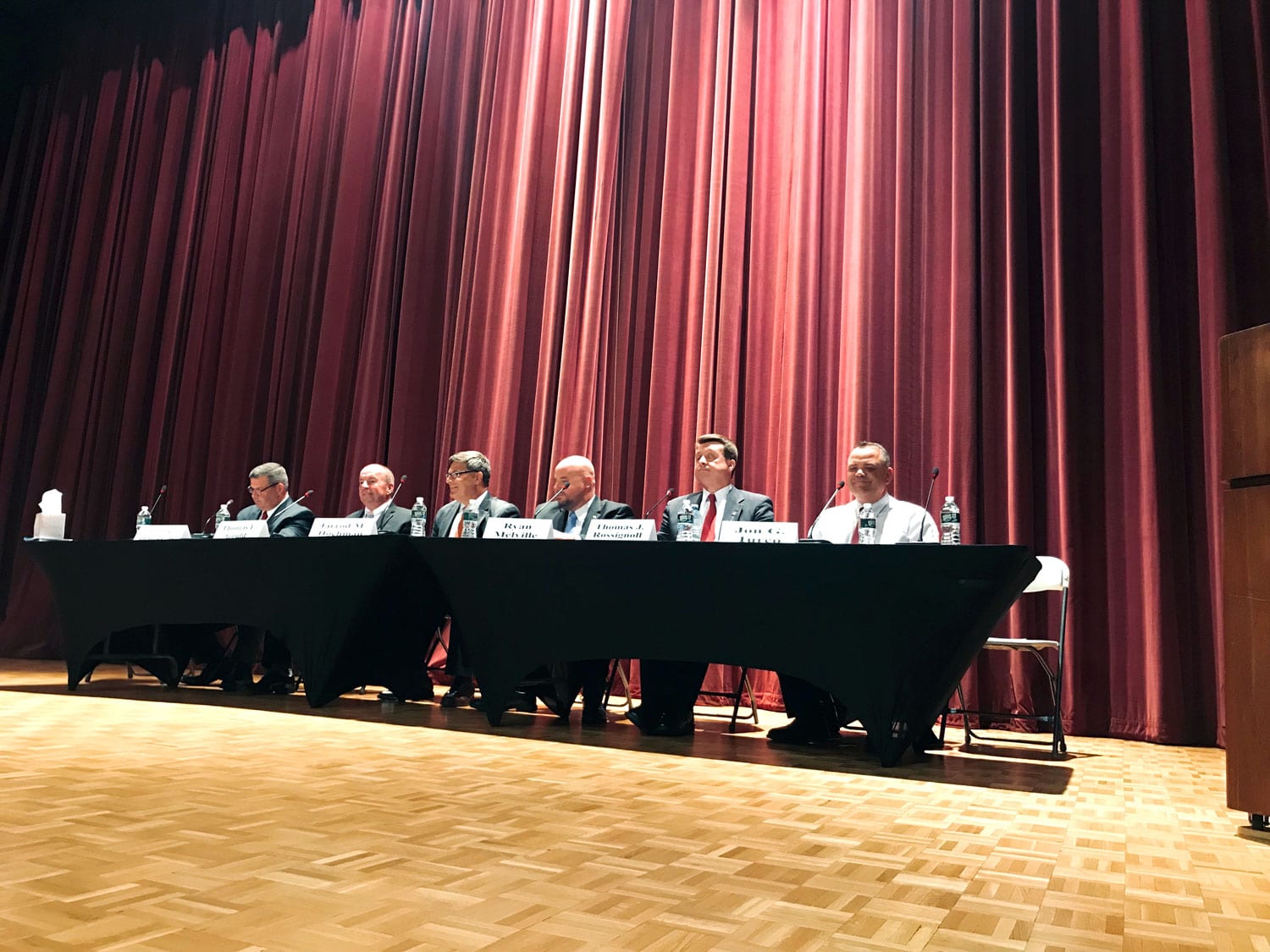PEABODY — There were lots of empty seats in the Wiggin Auditorium in City Hall Wednesday night.
The forum for City Council candidates co-sponsored by the Peabody Area Chamber of Commerce and the Salem News attracted four dozen voters, many of them friends and family of the hopefuls.
The election will be Tuesday, Nov. 5. There will be at least one new city councilor-at-large and a rookie Ward 1 councilor.
The at-large incumbents seeking reelection include Ryan Melville, Thomas Rossignoll, Thomas Gould and Anne Manning Martin. She was unable to attend due to a scheduled vacation.
In addition, Ward 1 Councilor Jon Turco is seeking an at-large seat, along with Peabody Police Capt. John DeRosa Jr., and School Committeeman Jarrod Hochman.
In Ward 2, Jaclyn Corriveau is challenging three-term incumbent Peter McGinn. The open seat in Ward 1 will feature a battle between Craig Welton and perennial candidate Russell Donovan. In Ward 6, incumbent Mark O’Neill faces opposition from Keith Doucette, the man behind the Moving Peabody Forward blog. Ward 4 Councilor Edward Charest faces competition from John Salisbury-Rowswell.
The two-hour session began with the at-large candidates, who were asked about key issues facing the city, what can be done to build more workforce housing, a term used to describe housing that can be afforded by middle-income residents; what needs to be done to put Peabody on the map; and if the recent hike in building permit fees would discourage developers.
DeRosa cited affordable housing as the major challenge Peabody faces. He said keeping the tax rate low while providing services, and keeping seniors in their homes are his priorities.
He pledged to work with the district’s Beacon Hill delegation to get more housing built. He said the way to put the city on the map is to develop a regional transportation plan. It’s unlikely builders would avoid the city due to a hike in fees because the city has so much to offer.
Gould said the most pressing issue is to keep the tax rate affordable, especially for elders, build a new high school, and continue the revitalization of the downtown. He acknowledged rents are out of control and every community is dealing with the lack of workforce housing.
On building fees, he said the city is now in line with neighboring communities. Transportation is important, he said, and everyone from the mayor, the council, to the governor should be engaged in talks on how to expand public transportation in Peabody.
“Traffic is killing us,” he said. “We need to look at it with a regional perspective.”
According to Melville, the biggest issue facing the city is balancing the need to upgrade the city’s infrastructure while keeping the city affordable. On how to get more housing built, Melville said the council took the right step by identifying parcels for development while protecting neighborhoods.
“We took a proactive step with housing by creating an overlay district,” he said. “That’s so developers know where they can build.”
Rossignoll said he is focused on striking a balance between development and over-development.
“We need to maintain and improve our infrastructure,” he said. “And make the downtown a destination and not just a cut through to get to Salem.”
Turco said he is a nuts and bolts councilor who does his best to make sure requests for streets and sidewalk improvements are done. He said the $35 million investment in water infrastructure should make a difference in quality of life.
On affordable housing, he said the city has almost reached the state’s 10 percent threshold.
“The city has done a great job,” Turso said. “We are only 163 units short of the goal.”
On transportation, Turco said the city needs federal assistance to make things happen. He likes the idea of a trolley linking the city to Salem.
Traffic, he said is an issue in Peabody as it is statewide.
“Unlike when we were students, every kid in the house has a car,” he said. “Instead of one kid driving several kids, they are each driving their own.”
Hochman said the biggest problem facing Peabody is overdevelopment. While development is good, he said, so is protecting neighborhoods.
“We do need to obtain different ways to generate revenue other than taxes,” he said.
On making more affordable housing available, he said developers of large projects should set aside 25 percent of the units for low- and moderate-income wage earners. On transportation, he said bus routes should be increased to offer Peabody residents more options.
In the Ward 1 race, Donovan said traffic is the number one issue and he blamed it on years of development approved by the City Council.
Welton, his opponent, said maintaining the city’s high quality of life while maintaining affordability is key. He suggested the council use so-called smart growth initiatives to build housing.
In Ward 2, Councilor McGinn said he could not name one major issue. But he noted keeping housing and taxes affordable are important.
Corriveau, his opponent, said the smell emanating from the Rousselot gelatin plant is a major cause of concern in the neighborhood.
“They are making a good faith effort, and they employ 100 people,” she said. But the city needs to be vigilant, she added.
Ward 4 Councilor Charest said the rat problem is a major complaint among residents.
“We can’t hide from it and it needs to be addressed,” he said.
Challenger John Salisbury-Rowswell said traffic and overdevelopment, including plans for the former J. B. Thomas hospital site, are among the major issues facing Peabody.
Ward 6 Councilor O’Neill said upgrading infrastructure while keeping the city affordable is his goal for the next term.
Doucette, his challenger, said elders must be protected and not overburdened with real estate taxes.

